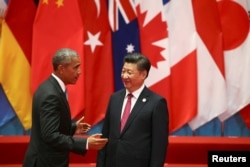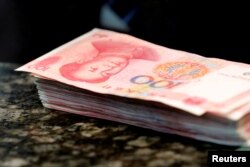Rising protectionism and trade conflicts with China are major concerns as Asian markets wait for policy clarity from a U.S. administration led by President elect Donald Trump.
During the election campaign, Trump pressed for sharp increases in tariffs with China as well as accusing Beijing of being a “currency manipulator” in order to favor its exports.
Business analysts and economists in Asia say any policy of trade protectionism would negatively impact the global economy.
Triphon Phumiwasana, a partner with Thailand-based Hatton Capital Partners said, “What I’m worried most about Trump’s policies is the protectionism of his programs, especially towards China. Once it hits China then the rest is basically the supply chain to China and that the production house can slow down and the whole supply chain can slow down – that’s the most worrisome.”
If Trump follows through with a sharp rise in tariff rates, that would not only affect U.S. workers and companies, but could trigger a trade war as well, analysts say.
Trade wars
China’s Global Times argued in an editorial on Monday that Trump’s threats of tariffs were most likely just campaign rhetoric. But if he did go through with tariffs, China would take a tit-for-tat approach, it said.
“A batch of Boeing orders will be replaced by Airbus. U.S. auto and iPhone sales in China will suffer a setback, and U.S. soybean and maize imports will be halted,” according to the opinion piece, adding that “China could also limit the number of Chinese students studying in the U.S.”
U.S. exports to China have seen tremendous growth while President Barack Obama was in office. At the same time, however, the trade deficit between the two countries continues to set new records, rising to more than $365 billion in 2015.
Analysts say a policy of “America First” that favors U.S. business at home, is also seen by analysts as adding to a tendency of U.S. “isolationism” and impacting U.S. relations with South East Asia.
The threat by Trump to “punish” American companies that outsourced jobs is seen as having possibly a major financial impact on the Philippines. Analysts say the ‘business process outsourcing sector’ earns an equivalent to 10 percent of the Philippines national output (GDP).
London-based market analysts Capital Economics, in a commentary, said imposing high tariffs on all U.S. imports from China “could cause real damage to China’s economy.” Other regional economies – key suppliers to the China market – such as Taiwan and Malaysia, would also be hit.
Capital Economics analysts say Trump is likely to begin his presidency by labeling China “a currency manipulator,” triggering talks between the U.S. treasury and China on currency policy
Protectionism and growth
Daniel Bean, head of foreign exchange research at the Sydney-based ANZ Banking Group, given the U.S. is a major trading partner for Asia, moves to protectionism could impact growth.
Bean was also concerned over policies towards China.
“Trump’s comments around maybe the Chinese are currency manipulators in his first day in office would not create an environment that’s particularly helpful,” Bean said.
Bean said Asia faces uncertainties “at least until the inauguration in January, there will certainly be a lot of questions” where economic growth in the U.S. at present “looks reasonable” and trade is “still free and clear.”
But Derek Scissors, an economist and resident scholar at the American Enterprise Institute in Washington D.C. said it is still too early to tell whether the Trump administration “will be more strategic about trade or outright protectionist.”
“If we only see restrictions, with no new initiatives to expand trade, that would say they are protectionist,” he said.
On the trade front, other concerns lie in moves by a Trump administration to renegotiate “or even scrap” a Korea-U.S. free trade agreement (KORUS).
Capital Economics analysts say “scrapping the deal would represent a major blow to Korea’s export sector, particularly automakers, who have been among the biggest beneficiaries from KORUS.”
TPP
Already impacted by the election campaign has been the 12 nation Trans Pacific Partnership (TPP) pact.
The TPP has been a key part of the Obama Administration’s ‘pivot to Asia’. But both Trump and Democrat Party candidate Hillary Clinton, campaigned against the deal.
Trump has said he will withdraw from the deal during his first day in office.
The 12 nations reached a final agreement in October 2015 and are awaiting ratification by each nation. Together, all countries in the TPP, including Vietnam and Malaysia, account for 44 percent of total U.S. goods exports and 85 percent of total agriculture exports.
A recent report by the Council of Foreign Relations said TPP reforms included strengthening intellectual property protections, promoting competitive and transparent business laws as well as enforcing labor and environmental standards.
While the TPP was seen as a “symbol of U.S. commitment to the East Asia region,” it was not immediately clear how big an impact Trump’s withdrawal could have on America’s role in region.
Some believe the end of the deal could boost China’s Regional Comprehensive Economic Partnership (RCEP), putting Beijing in a better position to spearhead its own agreements. Others, however, argue that China's free trade deals are more for the sake of public relations.
AEI’s Derek Scissors said what Trump needs to do is combine America’s withdraw from the TPP “with a new, meaningful initiative in Asia showing a different commitment than under Obama but nonetheless a strong U.S. commitment.”
Consequences
Just how big an impact Washington’s withdraw from the deal will have on China depends on what Trump does to follow up.
“If the US goes beyond rejecting TPP and begins to ignore Asia, then China will naturally become more important,” Scissors said. “However, this may lead countries such as Japan and India to seek to balance China rather than cooperate more.”
Malaysia’s Minister of International Trade and Industry (MITI) Mustapa Mohamed, told a conference in Kuala Lumpur that as many as one million jobs were to have been created under the pact. “If there is no TPP Agreement, then those would not be generated,” he said.
Economists say Trump is likely to compromise on several policy issues, including tariffs on goods from China, and a renegotiation of the free trade deal with South Korea.
ANZ’s Daniel Bean, reflecting a tone among analysts, is optimistic Trump’s campaign rhetoric will adjust once in office.
“What was said on the campaign trail relative to the reality of what occurs is still something that is open to question. So you have to be optimistic, to hopefully when the reality of office arrives, the tone of diplomacy changes somewhat,” Bean said.
The Governor of the Thai Stock Exchange, Prinn Panitchpakdi, agreed, telling VOA, “What is the rhetoric, what is the reality, what is the real policy? One thing I hope [is that] he will get more constructive, and more practical – which I think [he will]. He a practical man, he’s a businessman.”
Joyce Huang and Bill Ide also contributed to this report.







